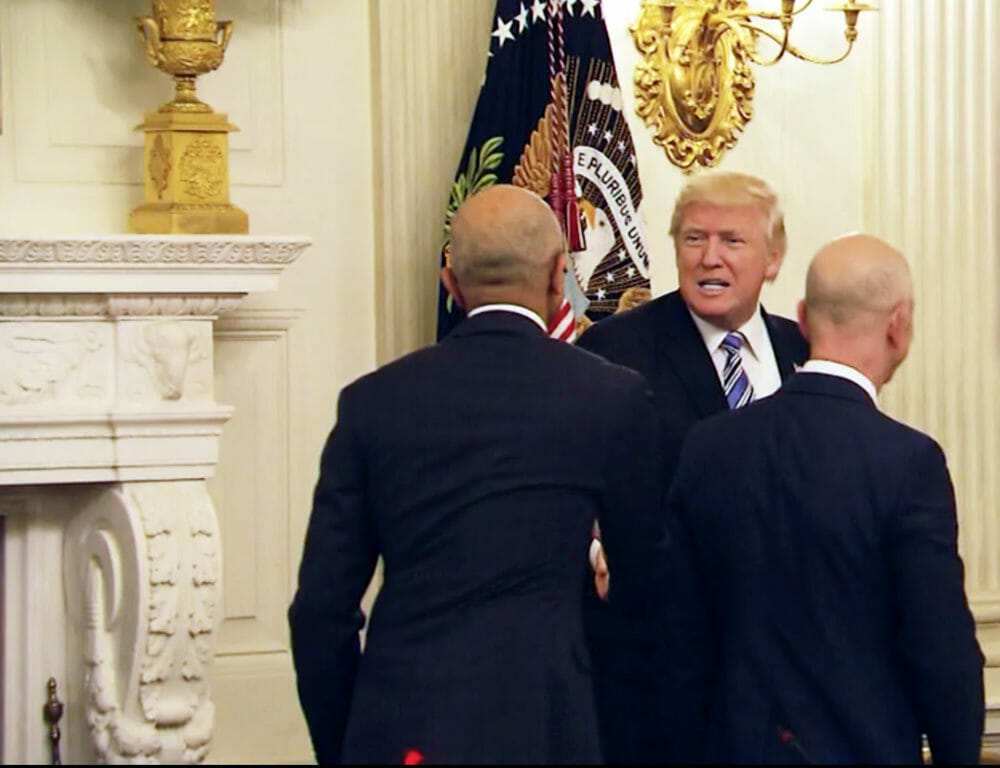Summon Your Tech Kids to the White House Day
Trump’s tech summit was all fantasies (of austerity) and marshmallow fluff What does daddy do at work? Serve lunch to CEOs Jeff Bezos and Satya Nadella. / CNN
What does daddy do at work? Serve lunch to CEOs Jeff Bezos and Satya Nadella. / CNN o
l
u
m
n
s
For the second time since Trump was elected president, tech CEOs have trekked out east to parley with the commander-in-chief. On Monday afternoon, there went the heads of Apple and Alphabet, IBM and Amazon, Oracle and Microsoft, carted into the White House for a day of workshops and discussions. In the executive suites of Cupertino and Mountain View, these maximum thought-leaders are uber-confident, puffing out their chests like well-capitalized masters of the universe and congratulating themselves on their ideas for saving the world. But in the halls of government power, they are as meek as little children, even when faced with the likes of the Fauntleroyish Jared Kushner, who was, it should be noted, newly verbal for the occasion. It was the inaugural meeting of the American Technology Council, a new body charged with coordinating government IT policy, and the tech CEOs all but crawled into their superhero lunchboxes.
Who benefits when tech CEOs meekly take their seats before Trump, indulge his blather, and then jet home proclaiming victory for political comity?
The script for these events is by now a familiar one: industry leaders mug their way through awkward photo ops and gab with various government officials about “streamlining services” or how brightly the synergy of public-private sector collaboration can shine. Beyond, perhaps, some airy talk about principled disagreements, it’s impossible to find a scintilla of dissent against the administration or its policies. If the executives dare to intrude upon the territory of substance, it is to gently shake the bushes for their money-makers—tax breaks, H-1B visas—and vie for a piece of the U.S. government’s $90 billion yearly spending on IT services. But if you were hoping for a grand moment of confrontation or some act of protest against the travel limitations placed on thousands of Muslim tech industry workers, you’ll have to hold out for next year’s meeting. (Credit on that front goes, improbably, to Elon Musk, who made himself look comparatively bold by quitting a Trump economic advisory board earlier this month.)
These, needless to say, are not the resistance leaders we are looking for. The rulers of Silicon Valley know how to play nice in Washington, and all they have to change is their swagger; whether lording it up in the west or groveling in the east, they stump for a supposedly pragmatic technocracy that just happens to go down easy in today’s plutocratic climate. This is their political posture, such as it is, but they’d rather you didn’t call it that. Technology, you see, can stand beyond the edge of politics.
In the Bezos-owned Washington Poston Monday, Jennifer Pahlka offered an instructive gloss on this feckless post-political mindset. An appointee in the last administration (she served as deputy chief technology officer under President Obama), Pahlka nonetheless chose to attend the council meeting because she thinks that working to modernize U.S. government IT infrastructure is something that will benefit everyone. We might even have believed her if she hadn’t gone on to offer a concrete example: food stamps. Accessing food stamps, she explained, used to require a computer and broadband internet or, failing that, filling out pages of forms in a local office. Now, she crows, “you can apply on your mobile phone in seven minutes.”
Valuing means over policy and outcomes, Pahlka presents a perfect distillation of the technocratic mindset. She finds herself halfway through her op-ed before acknowledging that the Trump administration is pillaging social programs like food stamps (to provide tax cuts that will incidentally benefit billionaire tech CEOs). But Pahlka has a remedy: “Giving governments the tools to do more with less can have an immense positive effect on those Americans who rely on these programs. It will not make up for the cuts, but it will allow these programs to do the most good they can under the circumstances.”
Austerity is—always and ever—a tool used to grind the poor into obeisance even while claiming that the sacrifices are shared.
Right, yes, “under the circumstances”—what a wonderful euphemism to describe the three-alarm fire currently consuming our governing structures. It reflects a passive accommodationism that has become a perilous condition among Democrats, who saw themselves spending much of Obama’s first term hoping to find common ground with moderate Republicans, a mythical species not known to exist in the wild. It has since spread to the wider liberal population, who seem?to think that capitulating to the political goals of the right will somehow help them in the next election. (The latest example of this deluded thinking: Democrats allowing Republicans to push forward with their healthcare legislation, hoping to produce a self-inflicted electoral wound in 2018.) This debased logic promises that another great political victory could be around the corner, but it’s going to take some painful, risky compromises in the here and now.
Doing more with less is a demand usually placed upon those with the least political power and not, say, an obscenely bloated military establishment or a tech industry that provides lucrative cloud computing contracts to the intelligence community. We can pretend that it will be the government, not the people, who will be leaner, but that doesn’t make austerity any more appealing. It’s not just that cutting government spending often means eliminating solid middle-class civil service jobs. It’s that austerity is—always and ever—a tool used to grind the poor into obeisance even while claiming that the sacrifices are shared.
What good is a slicker interface on a food stamps app when the budget underpinning that social program has been decimated to build another aircraft carrier? Who benefits when tech CEOs meekly take their seats before Trump, indulge his inarticulate blather, and then jet home proclaiming victory for political comity? The answer, of course, is not you and me. But if America’s tech elite had something useful to say against Trump — any kind of political program at all, even one that reflected the discontent burbling among many tech workers—we would have heard it by now. These tech leaders see only efficiencies to be mastered, contracts to be won. Corporate liberalism won’t save us. It’s too focused on preserving its seat at the table. And there’s another Trump-tech confab scheduled for Thursday.




















